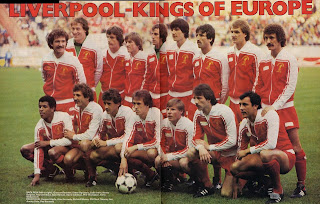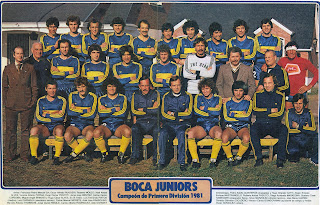The European Champions Cup was true to
expectations right to the final, save for one surprise. One, but
huge: in the first round the reigning cup holders were eliminated by
CSKA (Sofia). The Bulgarians won both legs against Nottingham Forest
– 1-0 each match. True, Nottingham Forest were never overwhelming
team and already showed signs of reaching the top of their potential
and losing interest. True, CSKA dethroned Ajax in 1973 and by 1980
managed to build new strong team after years of uncertainty, lead by
young talented coach Asparoukh Nikodimov. But it was great surprise
nevertheless: Bulgarian teams never performed well against British
teams and Nothingham was the best team in the world at the moment.
Reason failed, the underdogs won.
The draw was easy on the favourites
all the way to the ¼ finals and CSKA was lucky too – they played
against Szombierki (Bytom) in the second round. The weakest ever
Polish champion was no match and lost both legs. In the ¼ finals
CSKA met the second English representative – Liverpool – and this
time nothing unusual happened: Liverpool, in perfect form, destroyed
the mavericks 5-1 and 1-0. Only Inter (Milan) and Crvena zvezda
(Belgrade) was tough pair and after the first leg the Yugoslavian
champions seemingly had the edge – they managed a 1-1 tie at the
inhospitable Italian ground. In Belgrade Inter won 1-0 and qualified.
No more easy games at the semi-finals:
Liverpool vs Bayern and Real Madird vs Inter. All former Champions
Cup winners with great ambitions. Real won 2-0 at home and lost only
0-1 away, thus reaching the final for the first time since 1966.
Bayern survived in Liverpool – 0-0 – but Liverpool was not giving
up: 1-1 in Munich. The away goal qualified Liverpool, may be luckily.
On May 27, 1981 Liverpool and Real
Madrid met at Parc de Princes, Paris. In front of over 48 000
spectators, not the greatest crowd attending a final, the opponents
had a lot at stake: Liverpool wanted their 3rd Cup –
Real Madrid its 7th. Perhaps the pressure was more on the
Spaniards – their fantastic dominance in the late 1950s and early
1960s was a heavy burden. The club lost a lot of its aura after 1966
and was desperate to restore its fame as a world football leader. But
times changed... the battle was heavy and not very inspiring.
Laurie Cunningham in attack – an
Englishman against English team made largely of Scots.
Liverpool defended well, not forgetting
to attack. As a whole, they were slightly better, but the strikers
were unable to put the ball behind the goalkeepers.
Near the end a goal was scored at last
– Alan Kennedy, the left full back of Liverpool, gave the lead to
the British in the 82nd minute. And they preserved it to
the final whistle.
Final, Parc des Princes, Paris, 27 May 1981, att 48360 Liverpool (0) 1 Real Madrid (0) 0 82' 1-0 L: A.Kennedy Liverpool (trainer Paisley:Clemence; Neal, Thompson, Hansen, A.Kennedy; Lee, McDermott, Souness,R.Kennedy; Dalglish (Case), Johnson Real Madrid (trainer Boskov: Agustin; Cortes (Pineda), Navajas, Sabido; Del Bosque, Angel, Camacho, Stielike; Juanito, Santillana, Cunningham Referee: Palotai (Hungary) Phil Thompson receives the European Champions Cup.
After that – happy winners Graeme Souness, Kenny Dalglish, and Alan Hansen make their lap of triumph.
Real Madrid was perhaps bitterly disappointed – no 7th Cup for them – but the truth was they did not really deserve it. Compared to Liverpool, Real was inferior team. Yes, they had Stielike, Santillana, Camacho, Del Bosque, Juanito, Cunningham, but the defense was rather ordinary. Even in the 1970s Real had stronger squads. They fought, but it was clear that winning would have been possible only with grit and cunning. Real had to wait and reshape before winning anything in Europe.
Kings of Europe for a third time. What more to say? Liverpool came even with the great teams of the early 1970s – Ajax and Bayern – thus becoming one of the greatest clubs ever. In consistency and wise policy they surpassed everybody: Real was unable to keep excellent squad after 1966, Ajax disintegrated after 1973, Bayern had 5 miserable years after their last triumph, but Liverpool kept strong squad since 1964, which seemingly was only getting better and stronger. Changes were carefully made and those gone were replaced by new excellent players. Not long ago Kevin Keegan was the bog star – and he still was arguably the best European player – but Liverpool had a new emperor, Kenny Dalglish, and better don't ask who was the better player – he or Keegan. New boys were pushing ahead all the time: Hansen, Alan Kennedy, Johnson, Lee. A national team player – Case – was already reduced to a substitute. Liverpool was already a legend and beloved across the world. With them, the English club dominance continued: the European Champions Cup was kept in England for a straight 5th year and rightly so: European football became too tactical and physical. The English teams were the only ones playing brave attacking football – the fans liked that. It was only fair Liverpool to win and they did. Kings of Europe indeed.




























